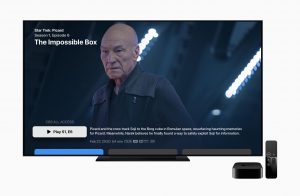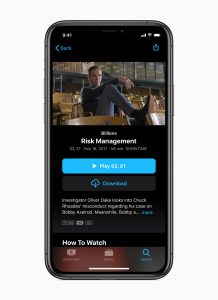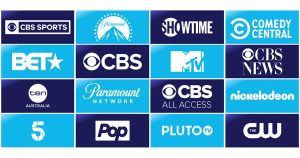
After more than 40 years of operation, DTVE is closing its doors and our website will no longer be updated daily. Thank you for all of your support.
Apple makes authoritative stamp on aggregate OTT market with ViacomCBS bundle

In the week when ViacomCBS was reportedly mulling adding a now-ubiquitous mathematical symbol to its upcoming streaming service, the company also launched a cut-price bundle for Apple TV+ customers in a move that has big implications for both companies.
The news will see Apple offer a bundle of ViacomCBS’s US SVODs – CBS All Access’s ad-free tier and Showtime – for US$9.99 per month to Apple TV+ customers (both those who are currently approaching the end of their one year free trial and those paying US$4.99 per month) via its Apple TV app.
For Apple, the deal is the first bundled offer it has launched for its nascent Apple TV+ service, which presents an interesting extra added value proposition for customers. But much more than that, the deal shows that Apple is serious about competing with the likes of Amazon and Roku as an OTT aggregator.
That’s because users signing up to the offer will not download separate apps, but will access all of CBS All Access and Showtime’s content through the Apple TV app, much akin to how users can access the likes of Starz and the soon-to-be-publicly listed CuriosityStream.
Apple has had ambitions to be a content aggregator for some time, as evidenced from the UI of the Apple TV app which places the iPhone-maker’s own SVOD as a channel within rather than as a standalone service.
While it certainly gives prominence to its own content, Apple TV+ originals are nestled among shows from other services like Amazon Prime Video, BBC iPlayer and Disney+ within a neatly designed interface. Selecting that other content will launch the respective app, but this will not be the case with shows and movies from the ViacomCBS services – with the new offer presenting Apple’s idealised version of content aggregation.
An app within an Apple
Channels are not a new concept for Apple, but the ViacomCBS deal seems to represent an evolution of the strategy and Apple TV+ as a potential gateway for user discounts.
As Maria Dunleavey, analyst at Ampere says: “Apple already offers more than 30 channels on its US channels service with an average price of around US$6.50 per channel so the bundled cost at US$9.99 for both CBS All Access and Showtime is an appealing offer at an effective price of US$5 per service; a discount on even the ad-funded version of CBS All Access.
 “While this would be the first time an Apple TV+ buy-through has been needed, the barrier to entry is not particularly high due to the volume of consumers who will have free access to Apple TV+ through device purchases.”
“While this would be the first time an Apple TV+ buy-through has been needed, the barrier to entry is not particularly high due to the volume of consumers who will have free access to Apple TV+ through device purchases.”
It does have some distance to make up though, with channels already being a key component of both Amazon and Roku’s businesses.
Apple however will want to avoid falling into the trap that has befallen Amazon and Roku, which have become so set on the channel model that they have come to blows with major operators.
WarnerMedia and NBCUniversal launched their respective major streaming services in the past couple of months, and to date neither are available on Amazon or Roku devices due to their reported insistence that HBO Max and Peacock are both huddled in the channels section rather than as standalone apps.
Warner and parent company AT&T have been the most outspoken in this matter with an overt publicity war with Amazon. In a recent interview, WarnerMedia CEO Jason Kilar said that “if Amazon were truly focused just on the consumers with Fire devices, HBO Max would be on Fire devices.”
Similarly, AT&T CEO John Stankey told investors on the company’s Q2 earnings call that “we’ve tried repeatedly to make HBO Max available to all customers using Amazon Fire devices, including those customers that have purchased HBO via Amazon,” and that “Amazon has taken an approach of treating HBO Max and its customers differently on how they’ve chosen to treat other services and their customers.”
For Roku’s part, CEO Anthony Wood said that getting the services on the company’s devices is not a priority, recently telling investors: We’re not always the first, when it comes to adding new services to our platform, because it’s important to us that we establish a win-win relationship, regarding that economic model with our content distribution partners, as well as with our advertisers which is what funds our business.”
Meanwhile, Apple device owners are able to access both these services on their iOS and Mac OS products, but they sit firmly as their own apps and are not integrated with Apple TV.
As Apple looks to emphasise its channels section, it may start making it more central to discussions with platform operators, but it would do well to avoid the current impasse facing the aforementioned companies.
The one thorn to this rose from a consumer perspective however is the apparent user-railroading into the Apple TV app. This means that bundle buyers will not be able to access these non-Apple streaming services on devices that don’t have the Apple TV app. The app is currently available on select Samsung and LG smart TVs, Roku and Amazon Fire TV devices, and, of course, Apple devices. Rollouts are planned for Sony and Vizio smart TVs later this year, but there remains no plans to release the app to Android, Android TV or Windows device owners.
Dunleavey however doesn’t feel like this will pose too much of a problem in terms of accessibility. She says: “Consumers who do take up the bundled offer will be able to view the CBS All Access and Showtime channels via their Apple devices. This shouldn’t hinder accessibility too much as virtually all (96%) of Apple TV+ subscribers in the US claim to own at least one Apple device. Notably, Apple device ownership is high in the US – two out of three respondents in our latest consumer wave claimed to own at least one Apple device, of which around one in six owned an Apple TV.”
The ViacomCBS perspective
While it is undoubtedly revving up towards the launch of its new streaming service (now likely to be called Paramount+), ViacomCBS has outwardly been very enthusiastic about the exposure that the new bundle will offer its current services.
 David Nevins, CBS’s chief creative officer and Showtime Networks’s chairman and chief executive officer said: “Showtime is pleased to be part of a package with CBS All Access offering our broad array of truly addictive series, sports, and documentaries to Apple TV+ subscribers. It’s great to be able to reach so many viewers with an offer that delivers our premium content through the Apple TV app.”
David Nevins, CBS’s chief creative officer and Showtime Networks’s chairman and chief executive officer said: “Showtime is pleased to be part of a package with CBS All Access offering our broad array of truly addictive series, sports, and documentaries to Apple TV+ subscribers. It’s great to be able to reach so many viewers with an offer that delivers our premium content through the Apple TV app.”
Marc DeBevoise, ViacomCBS’s chief digital officer and ViacomCBS Digital’s president and chief executive officer, expressed a similar sentiment, saying: “There’s no better time to launch this special bundle.”
ViacomCBS will know that if it can attract a significant number of SVOD subscribers now – its current goal for 2020 is 18 million, but that was set before the Apple deal – then it will have a greater shot at initial success for its new streaming service. Whether that is providing the existing subscribers with a free upgrade or providing an easier means to pay an extra couple of dollars a month for a bumped-up product, getting as many eyeballs on its streamers as possible right now will improve exposure in the future.
The one trade-off is a significantly reduced ARPU, which will mean that the bundle has to do significantly well in order to make up for the lost revenue that it would have had from subscribers signing up previously.
In an ideal scenario, ViacomCBS would look to emulate the exponential growth of Disney-owned ESPN+ which, despite having seen a 22% drop in ARPU, has seen the number of subscribers grow by more than 100% from 2.4 million to 8.5 million year-over year as of Q2. This massive jump can largely be attributed to the launch of Disney’s US$12.99 per month bundle of Disney+, Hulu and ESPN+.
Dunleavey says that ViacomCBS will expect to see significant growth as a result of this Apple deal and believes that the reduced ARPU will be less of a factor in the build up to the 2021 launch.
She says: “If this move helps CBS All Access and Showtime to increase their streaming market share, this would create a large group of consumers who may want to upgrade. While it will have a diminished ARPU (especially if Apple is also taking a cut), it could help ViacomCBS to once again beat its subscriber targets. At the beginning of the year, the company said it was aiming for more than 25 million subscribers by 2022, and we expect it to hit that milestone next year.”
Mutually beneficial
Overall, Ampere’s Dunleavy feels that both parties will benefit from this partnership: “The deal is mutually beneficial; it could help to drive up Apple TV+ subscriptions, especially among consumers who already take both CBS All Access and Showtime, as even paying the additional US$4.99 per month for Apple TV+ would still be a price reduction for consumers.
“Additionally, when the next iPhone device comes out later this year, there will be a swathe of consumers who may be getting access to Apple TV+ for the first time, meaning even more marketing for the two bundled streaming services.”
She goes on to point out that, from Ampere’s research, fewer than one in six Apple TV+ subscribers had CBS All access, meaning that “the addressable market is already quite large – especially considering the increasing familiarity of SVoD stacking.
“Apple TV+ subscribers over-index for SVOD stacking, with the 80% of subscribers in our latest consumer wave claiming to have access to five or more services.”
Clearly this deal is the kind of ‘win-win’ that the Roku boss said is central to its strategy, and Apple will look to push on with its Apple TV product as a fundamental part of its increasingly important services segment. (Particularly if, as reported, Apple does introduce its own services bundles around Apple TV+, Apple Arcade and Apple Music in the coming months.)
For ViacomCBS this marks a continuation of its strategy of playing nice with companies it seemingly is in competition with – such as licensing many of its key shows like South Park and The Big Bang Theory to rival streamers such as Netflix and HBO Max. But there may come a time when the company will need to be more aggressive and self-dependent, at which point it may come to similar blows with platform owners as Warner and NBCU.
For now this is a welcome pairing which is mostly a net-positive for consumers, and the market will dictate the evolving strategies of both companies and their business relationship.



